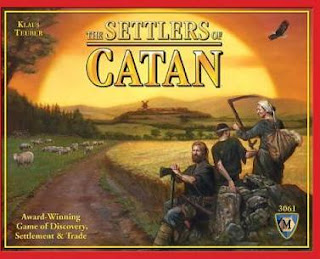 There are some games that almost redefine their genres. Settlers of Catan is a board game with no "real" board, substantial conflict with no actual combat, plenty of negotiation with no shared victory, careful planning that's easily undone by luck -- and a true classic.
There are some games that almost redefine their genres. Settlers of Catan is a board game with no "real" board, substantial conflict with no actual combat, plenty of negotiation with no shared victory, careful planning that's easily undone by luck -- and a true classic.The goal of Settlers of Catan is simple: The first player to get 10 points wins. Players get points by building settlements, upgrading settlements to cities, making the longest road, creating the largest army, or having the right development cards. And the key to doing all of this is resource management.
 The island of Catan is composed of a series of hexagons, each of which produces one resource: wood, brick, wheat, sheep, or ore. (There's also a desert tile that produces nothing.) Surrounding the island are water tiles, which include ports. After the tiles are placed, a series of numbers -- from 2 to 12, except for 7 -- are placed on each tile. Players begin with two settlements and two roads.
The island of Catan is composed of a series of hexagons, each of which produces one resource: wood, brick, wheat, sheep, or ore. (There's also a desert tile that produces nothing.) Surrounding the island are water tiles, which include ports. After the tiles are placed, a series of numbers -- from 2 to 12, except for 7 -- are placed on each tile. Players begin with two settlements and two roads.Each turn a player rolls the dice, and the number rolled shows which tiles produce resources. Every player gets one of that resource for each settlement next to the tile, and they get two of that resource for each adjacent city. If a 7 is rolled, all players with more than seven resources have to discard half their hand; then the player moves the robber on top of a tile, stealing a resource from a player with a settlement/city next to that tile and preventing that tile from producing resources until the robber is moved again.
Next comes trading. Players can trade four of the same resource for any one resource. Ports give a specific trading benefit to players with a settlement or city on them: either three of the same resource for one, or two of a specific resource for any one. Players can also trade with each other -- and these negotiations can get quite heated.
Finally there is the building phase. Resources are turned in to build roads, settlements (as long as they're at least 2 spaces away from the closest settlement or city), or cities (which replace an existing settlement). A player can also buy a random development card: soldier (letting them move the robber and steal a resource), victory point, monopoly (giving them all of one resource from all other players), year of plenty (giving any two resources), or road builder (giving two free roads). Except for victory points, development cards are used the turn after purchased.
Ah yes, getting the longest road or largest army. If a player creates a road five segments long, they get two victory points for having the longest road, and a player who plays three soldier cards gets two victory points for having the largest army. Any other player can steal these by making a longer road or playing more soldier cards, and competition for these bonus points can determine who wins.
Settlers of Catan is a truly impressive game. The rules are fairly simple and easy to pick up. (There are also cards showing what resources buy which items.) Players can't attack one another -- the closest to this is using the robber to steal a resource and block a tile -- but players can block settlements by making a settlement near another player's intended spot, or sometimes build a settlement in the middle of the longest road, breaking it up. Many players will compete for a prime spot with good numbers, or a certain port -- and yet it's almost impossible to win without trading with the other players. It's quite the balancing act to trade for the resources you need without giving someone else too much of what they need.
Did I mention luck? No matter how carefully you plan, several bad rolls can spell doom and several unlikely rolls can prove amazingly helpful. (I find it frustrating to have settlements around the 6 and 8, then have neither come up for turn after turn.) Development cards can give a win -- but they also take resources away that might make a city; there's also no guarantee you'll get the card you need.
Settlers of Catan provides the perfect balance of luck and skill. The board is never the same, and the die rolls are upredictable, so new players won't be overwhelmed by experienced ones. But knowing where to build, what to buy, and when to accept or reject a deal are all keys to victory. If you're looking for a great game that's easy to learn and challenging every time, take a trip to the island of Catan! (There are numerous expansions and other versions, from the ancient Settlers of the Stone Age to the future-set Starfarers of Catan.)
Overall grade: A+
Reviewed by James Lynch



No comments:
Post a Comment